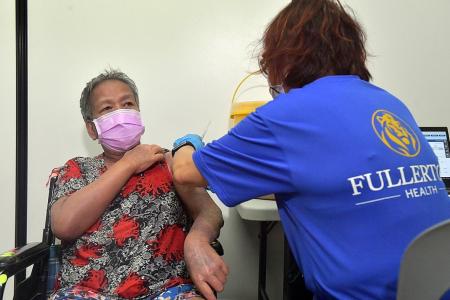Elderly, immunocompromised persons first in line for boosters shots
This is to ensure the level of protection among elderly and immunocompromised is the highest
If Covid-19 booster shots are needed, the elderly and immunocompromised persons will be first in line to get them, said the Ministry of Health's group director of crisis strategy and operations, Mr Dinesh Vasu Dash, yesterday.
He added "there seems to be some indication that the efficacy of the Covid-19 vaccines could be waning a bit faster (for the elderly) than the rest of the population, perhaps due to their physiological make-up".
Mr Dinesh did not specify how much faster the efficacy may wane for the elderly, but it was reported a few days ago that Israel plans to soon offer booster shots of the Pfizer vaccine to those over 60.
Israel's Health Ministry has said the Pfizer vaccine's effectiveness appears to have fallen to 39 per cent in the country as the Delta variant spreads. But the vaccine still prevents severe illness.
The MOH website says that the Pfizer-BioNTech/Comirnaty and Moderna vaccines have an efficacy of about 95 per cent in preventing symptomatic disease for those who have received two doses.
It also says updated data from phase three trials for both mRNA vaccines showed that they continue to be effective for at least six months with no signs of waning protection.
"If we do have a booster jab, those who are vulnerable, particularly those who are old, as well as those who are immunocompromised, will probably take the first shots to ensure that the level of protection among these groups is the highest," said Mr Dinesh.
He was speaking virtually to about 1,800 healthcare leaders here and abroad, at the Singapore Healthcare Management Congress.
Mr Dinesh delivered a lecture outlining Singapore's vaccination programme.
Last month, Health Minister Ong Ye Kung said booster shots for the Covid-19 vaccine may begin around next February, and could be needed to better fight against emerging new variants.
EFFICACY
Mr Dinesh added: "For immunocompromised persons, the evidence seems to suggest - again it is not conclusive at this point in time - that they may not be able to have the protection and immunity for long."
The expert committee on Covid-19 Vaccination last week cautioned that the vaccines may be less effective for immunocompromised individuals, such as those with HIV.
Mr Dinesh also said the efficacy of the vaccines against the Delta variant stands at 69 per cent to 70 per cent, which is "good enough if you have large swathes of the population protected".
Health experts both in the Health Sciences Authority and the expert committee are monitoring the development of the virus and new variants, to determine if booster jabs should be rolled out under emergency use authorisation, he said.
Mr Dinesh added that the authorities are in talks with vaccine firms - both mRNA ones and traditional vaccines - that are preparing new formulations for the booster shots.
He said the authorities have yet to decide whether the booster shots should come from the two mRNA vaccines as dosed-up versions against new variants.
The other option for booster shots could be to "mix vaccines", where the booster could be another vaccine type, to have potent vaccine combinations against other variants.
Get The New Paper on your phone with the free TNP app. Download from the Apple App Store or Google Play Store now



